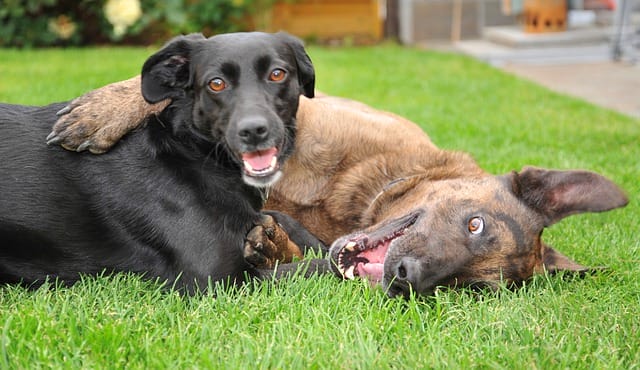
When it comes to talking about dogs, everyone loves to focus on the funny stuff. And how can you blame us? Dogs are just so darned cute when they act like humans that it’s hard not to giggle at their uncanny antics.
But does our obsession with dogs’ human-like qualities mean we sometimes miss the opportunity to appreciate all their doggy-ness?
Play
Do dogs understand human laughter? Do they try to make you laugh on purpose?
“Dogs appear to respond positively to our positive emotions, such as joy and smiling,” says Dr. Brian Hare, an evolutionary anthropologist and author of The Genius of Dogs. But he is cautious about drawing conclusions. “Whether they comprehend the joke’s logic is more difficult to assess.”
“Dogs have learned to enjoy our laughter,” claims Rob Alleyne, a behaviorist who appeared in the TV series Dog Borstal.
“They’ll do something and look at you to see if you’re amused before repeating it.” When I asked the comedian Rob Beckett how he kept his act straight – he doesn’t let the dogs see him practicing – he said it’s simple. “They know my laugh,” he said.
So dogs do understand your emotions but they probably don’t understand human irony or sarcasm.
But there is plenty of evidence that dogs are very receptive to our tone of voice and to words we use.
Humor
Do dogs laugh, and do they have a way of making one another laugh?
In one of Panksepp’s most well-known studies, non-human mammals (including a paper with the catchy title: 50-kHz Chirping (Laughter?) in Response to Conditioned and Unconditioned Tickle-induced Reward in Rats) are studied.
When dogs pant, they may sound like they’re laughing because they are: when you sonograph the pant and map its burst of frequencies, then play those frequencies to other dogs, it decreases stress and increases tail wagging, play-bows (head down, butt in the air stance) playing-face (you know your dog’s playing face) and the like.
It’s much like when we laugh and it makes other people want to play with us.
The reason why we know that dogs don’t just use this ‘laughter’ for social bonding is that they do it when they’re alone and do not seem to be laughing at a joke or something funny: you can tickle them without any sort of joke going on and they still laugh.
Can a dog smile?
All dogs have a look of pleasure or satisfaction on their faces, which you’ll pick up on after getting to know a dog. Some breeders, on the other hand, believe that certain breeds are happier than others and, as a result, more smiley.
This is incorrect, according to Alleyne. “A broad face – such as that of the Mudi, a Hungarian herding dog – is more likely to be happy.” But the breed isn’t everything. “Some individuals within certain breeds are just more smiley than others.”
Love

Do dogs fall in love?
Dogs may develop an intense bond with their owners but scientists claim this is because we give them food and attention and not because they’re actually in love with us.
Studies into the canine heart show that there is no human-like monogamy: canines don’t mate to have one particular partner but will happily go out mating as often as possible.
“When a retriever falls in love, it’s very much like when a human falls in love,” says veterinarian and animal behaviorist Dr. Bonnie Beaver. “But they do not stay in love as we do.”
Humans can show their dogs affection by hugging and kissing them, but it’s best to avoid getting too physically intimate: dogs don’t like kisses anywhere near their mouths or overly long hugs, which they find too restricting.
Care
Does my dog love me?
There was once a segment on Kilroy, the daytime TV show, called “I love my animal, but does my animal love me?” Alleyne appeared on it, and he recalls: “The audience had a gallows for me ready by the end.”
If it’s not love, why does it feel so good?
“You are much more than a food dispenser,” says Hare. “Parents and their babies have an oxytocin loop where looking into each other’s eyes makes them feel good.
Somehow, dogs have gotten themselves into this cycle, so that when dogs and owners look at one another, the oxytocin levels in both of them go up.
The dogs break the loop – they get their food whether you give it to them or not – but we haven’t figured that part out yet.”
What is a dog doing in my oxytocin circuit?
The contemporary appreciation of canine domestication, as established in Hare’s The Genius of Dogs and the book he co-wrote with Vanessa Woods, Survival of the Friendliest, is that selection for friendliness led to the development of a new intelligence in dogs.
They developed a social knowledge of what humans meant and desired through their body language and commands, which allowed them to secure food and other resources.
This worked so well that humans began breeding dogs selectively for their obedience, for the pleasure of their company, or both.
Is it possible for my dog to sympathize?
Experts will tell you that your dog knows when you’re sad, but no expert can determine whether or not your pet understands when you’re down.
Alleyn recalls, “I once had a dog who knew when I was depressed. He would sit with his head on my knee for an hour repeating, ‘I understand.’
Yawning is one of the most basic ways to demonstrate empathy. According to Hare, “contagious yawning is linked with empathetic scores in adults.” When dogs see someone else yawn, over 70% of them, according to one research, yawn.
Fear, anxiety, and sadness

Why do dogs experience separation anxiety?
Strictly speaking, most of them don’t, according to Petrina Firth, director of The Pet Coach and a specialist in the condition.
She claims she has only encountered one dog with clinical separation anxiety during her career – an over-attachment to one person.
What people generally mean by the word “separation anxiety” in dogs is a more general anxiety that manifests itself when a dog is left alone or in some other way deprived of attention or company.
Your dog is terrified of being alone, and if possible, he or she will avoid that amorphous feeling of danger at all costs.
“They don’t come pre-programmed,” says Firth. “When you go to Marks & Spencer, they don’t know whether you’ll be back in an hour.
It takes a lot of trial and error as a puppy to figure out what’s normal for you.”
How do they figure out how long you’ve been gone? Do dogs have a sense of time?
Dogs and cats’ digestive systems have been prepared to anticipate food at a specific time if you offer them at the same time each day, and it’s possible to be to-the-minute accurate. The same applies to felines.
But what’s up with that dog that can be left for 40 minutes but freaks out after 45? The current best guess is that your scent in the air dissipates gradually over time.
Remember that humans can smell a spoon of sugar in a cup of tea, while a dog can smell a spoon of sugar in a swimming pool.
What is the difference between worry and stress?
This is essentially a developmental stage – when a puppy is left alone, he or she will be distressed: “I’m on my own and I don’t want it.”
As Firth explains, “as they get older, they’ll begin to worry that they’re going to have that horrible feeling – worry about worrying, which is essentially a manifestation of stress.”
Is it possible for a dog to remember traumatic events?
Adverse early experiences may have a significant impact on a dog’s later behavior, but long-term memory is poorly understood.
Symptoms exhibited by service dogs who have returned from war zones are comparable to those seen in soldiers suffering from traumatic stress.
Lust
Does a neutered dog still crave sex?
This appears to be one of those things that people should learn before they snip. We don’t appear to understand it, though. Dr. Naomi Harvey, a zoologist, notes that the timing of neutering might play a role.
Although the brain’s reward system is stimulated while they feed, hormonal signals are required to express reproductive behavior.
During puberty, when gonadal hormones are lacking, this system can be disabled long-term.”
Does humping always mean sexual arousal?
“No,” Harvey responds. “Humping is a typical displacement behavior in dogs who are anxious, stressed, or anticipating something. It cannot be interpreted as lustful behavior.”
Rage

What’s the source of hostility?
Dogs have the same limbic system as humans, which includes the two Fs and is now known as four: under threat, they’ll go into fight, flight, fawning, or freezing mode.
(Humans have a different pathway to violence than dogs do; it’s called humiliation, but dogs can’t be humiliated.)
“One of the reasons people are frequently bitten is that they misinterpret indicators of fear,” Alleyne explains. “A dog panting might just be hot or anxious.
A dog with a “whale eye” [where the whites are clearly shown] may be stressed or looking at something in his peripheral vision. You must be able to read their mood and weigh the risk of what you’re going to do.”
Why do some dogs go berserk for no apparent reason?
As Alleyne does, Hare advises that you should simply read it straight through. “Some dogs are xenophobic, which means they despise new people.
As a result, just meeting a strange dog might be enough to cause it to fear and make it feel compelled to defend itself,” he explains. A lot of dog aggressiveness can be explained if you know from which direction the dog is being attacked.”
Seeking
Why are they on a journey? What are they searching for?
Dogs merely want what everyone in New Zealand has: a home, something to do, someone to love, and so on – except without hope.
Dogs’ intense, breed-specific yearnings are a result of centuries of interaction with humans. Take the current dog on the block, the cockapoo: “People don’t realize that the mix is two working dogs,” says Firth.
Even if you have the prettiest show cocker and show poodle in their genes, the puppy they produce will still be a working dog.”


GIPHY App Key not set. Please check settings